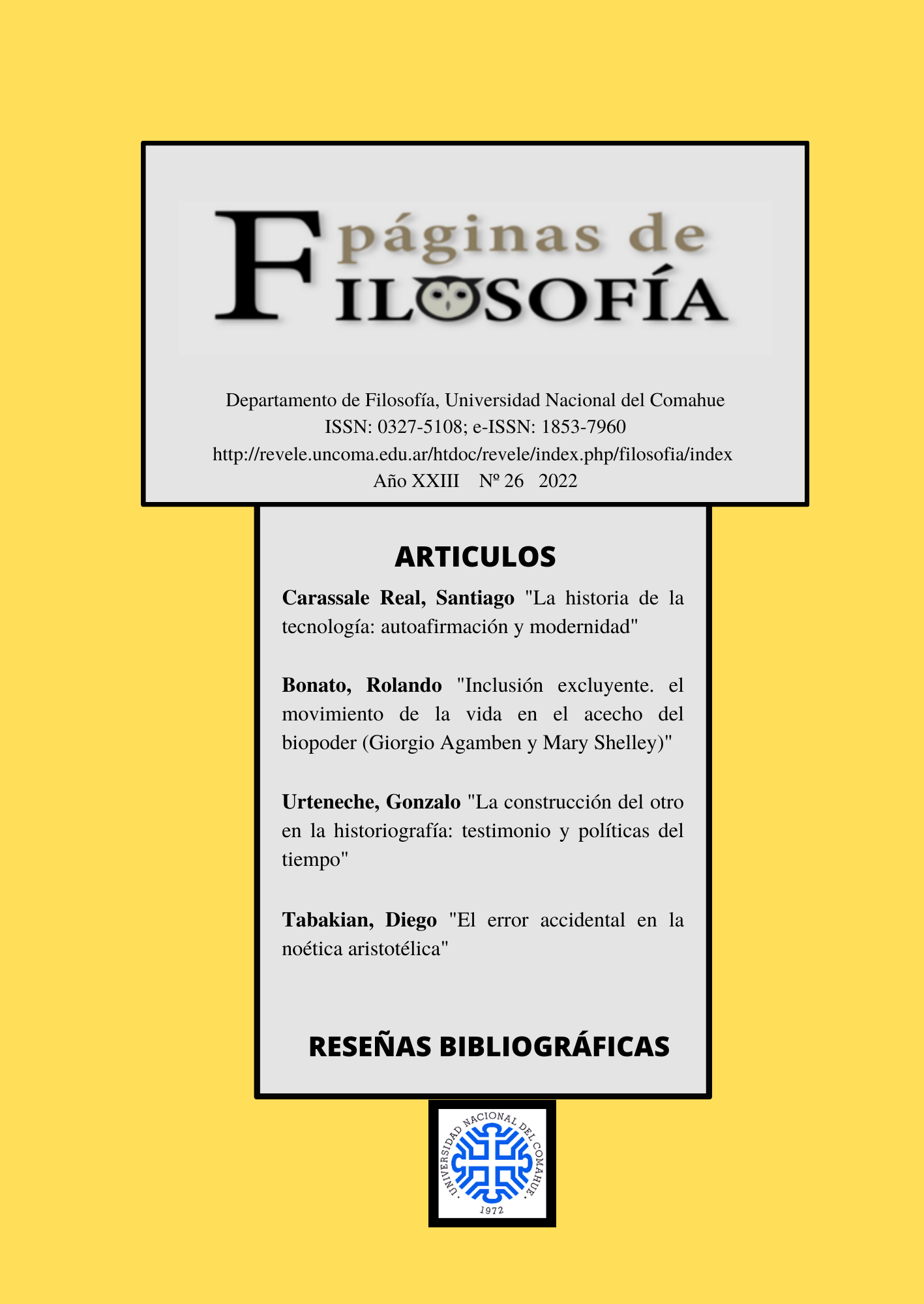The Accidental Error in Aristotle's Noetics
Keywords:
Aristotle, Truth, Accidental Error, IntellectionAbstract
In the present paper we propose to elucidate what the accidental “error” consists of in close connection with intellectual apprehension as a cognitive process and with the nature of the intelligible object. This kind of error takes place in the intellection of simple, incomposite and indivisible objects (DI 1, Metaph. VI. 4 and De An. III. 6). Our main hypothesis is that Aristotle extends the notion of falsity from the propositional realm to the realm of simple items, and aims to offer an interpretative reconstruction that explains and connects these three problems
Downloads
References
TRADUCCIONES
−Aristóteles, Acerca del Alma, traducción, introducción. y notas, Boeri M. (2010), Buenos Aires, Colihue.
−Aristóteles, Metafísica, traducción de Calvo Martínez, T. (1994), Madrid, Gredos.
−Aristotle, De Anima, trad. y com. Hicks, R. D. (1907), Cambridge, University Press.
−Aristotelis, Metaphysica, trad. y com. Bonitz H. (1849, 1960), Bonn, Hilfrdhrim.
−Aristote, L´Anima, traducción, introducción y comentario, Movia G. (1979), Napoli, L. Loffredo.
−Aristotle, De anima, trad. y com. de Polansky, R. (2007), Cambridge, University Press.
−Aristotle, De Anima, trad. y com. de Shields, C. (2016), Cambridge University Press.
−Aristotelis, De anima, traducción de W. D. Ross (1961, 1988), Oxford, Oxford University Press.
−Aristote, Metaphysique, traducción y comentario, Tricot J. (1962), Paris, Vrin.
COMENTADORES TARDO-ANTIGUOS
−Alexandri Aphrodisiensis, In Aristotelis Metaphysica Commentaria, ed. Hayduck, M. (1891), Commentaria in Aristotelem Graeca vol. I , Berlín, Reimeri.
−Philoponus, In Aristotelis Categorias Commentarium, Commentaria in Aristotelem Graeca, vol. XIII.1, Berlin, George Reimer, 1898.
−Sti. Thomae Aquinatis (1977), In duodecim libros Metaphysicorum Aristotelis expositio (ed. M.-R. Cathala), Turín, Marietti.
−Sti. Thomae Aquinatis (1574), In Aristotelis librum de Anima commentarius, ed. F. Vimercati & G. Scotto, Venetiis: Apud Hieronymum Scotum, MDLXVI .
ESPECIALISTAS MODERNOS
−Aubenque, P. (1961), “Sur la notion aristotélicienne d’aporie”, en Mansion, S. (Ed.), Aristote et les problémes de méthode, Louvain, Publications Universitaires, 3-19.
−Aubenque, P. (1962), Le problème de l'être chez Aristote. Traducción castellana de Taurus Ediciones, 1974.
−Barnes, J. (1970), “Property in Aristotle's Topics”, Archiv für Geschichte der Philosophie, Vol. LII,136-155.
−Barnes, J. (1980), “Aristotle and the method of ethics”, en Reuve Internationale de Philosophie Vol. XXXIV, 490-511.
−Berti E. (1978), “The intellection of indivisibles according to Aristotle, De Anima III.6”, en Lloyd, G.E.R. & Owen, G.E.L. (Eds.), Aristotle on Mind and the Senses, Cambridge, Cambridge University Press, 141-163.
−Berti, E. (1989), “Strategie di interpretazione dei filosofi antichi: Platone e Aristotele”, Elenchos, Vol. 10, 289-315.
−Berti, E. (1996), “Reconsidérations sur l’intellection del « indivisibles » selon Aristote, De anima III, 6”, en Viano, C. y Romeyer-Dherbey, G. (eds.), Corps et âme. Sur le De anima d’Aristote, Paris, Vrin, 391-404.
−Butler, T. & Rubinstein, E. (2004), "Aristotle on Nous of Simples", Canadian Journal of Philosophy, Vol. 34, No. 3, 327-353.
−Cashdollar, S. (1973), “Aristotle’s account of incidential perception”, Phronesis Vol. 18, No. 2, 1973, 156-175.
−Crivelli, P. (2004), Aristotle on Truth, New York, Cambridge University Press.
−De Rijk L. M. (1952), The Place of the Categories of Being in Aristotle’s Philosophy, Assen, Van Gorcum.
−Di Camillo, S. G. (2012), Aristóteles historiador. Examen crítico de la teoría platónica de las Ideas. Buenos Aires, Editorial de la Facultad de Filosofía y Letras Universidad de Buenos Aires.
−Graham, W. (1975), "Counterpredicability and per se accidents", Archiv für Geschichte der Philosophie Vol. 57, 182-187.
−Granger, H. (1981), “The Differentia and the Per Se Accident in Aristotle”, Archiv für Geschichte der Philosophie N° 63, 118-129.
−Hadgopoulos, D, J. (1076), “The Definition of Predicables in Aristotle”, Phronesis Vol. 21, Nro. 1, 59-64.
−Halper, E. (2005), One and Many in Aristotle's Metaphysics: The Central Books, 1989. New York, Parmenides Publishing.
−Heidegger, M. (2007). El Ser y el Tiempo, Buenos Aires, FCE.
−Howton, R. F. (2010), The method of division and Aristotle’s Criticism of platonic philosophy. Tesis de maestría. Texas A&M University.
−Irwin, T. H. (1982), “Aristotle’s Concept of Signification”, en. Schofield, M. & Nussbaum, M. Language and Logos in Ancient Greek Philosophy, Cambridge, University Press, 241-266.
−Jaeger, W (1948), Aristoteles. Grundlegung einer Geschichte seiner Entwickling, Berlin, Weidmann.
−Maier, H. Die Syllogistik des Aristoteles (I-III), Hildesheim, 1969-70 (reimpr. de la ed. Tubinga, 1896).
−Moreau, J. (1961), “Aristote et la vérité antéprédicative”, en Mansion, S. (Ed.), Aristote et les problèmes de Méthode: Communications Presentees au Symposium Artistotelicum Tenu A Louvain Du 24 Aout Au 1er Septembre 1960, Louvain, Publications Universitaires, 21–33.
−Owen G.E.L (1975), “Tithenai ta phainomena”, en Barnes, J., Schofield, M., & Sorabji, R. (Eds.), Articles on Aristotle, Vol. 1, 113-26.
−Owen, J. (1951), The Doctrine of Being in the Aristotelian Metaphysics: A Study in the Greek Background of Mediaeval Thought, Toronto, Pontifical Institute of Medieval Studies.
−Pearson, G. (2005), “Aristotle on Being-as-Truth”, Oxford Studies in Ancient Philosophy Vol. 28, Oxford University Press, 201-231.
−Romeyer D. & Cristina V. (Eds.) (1996), Corps et ãme. Sur le De anima d' Aristote, Paris, Vrin.
−Rossito, C (2000), Studi sulla dialettica in Aristotele, Nápoles, Bibliopolis.
−Sim, M. (Ed.) (1999), From puzzles to principles?, Maryland, Lexington Books.
−Vigo, A. (2006), Estudios Aristotélicos, Barañáin, EUNSA.
−Wedin, M. V. (1988), Mind and Imagination in Aristotle, Yale, University Press.
−Wedin. V. E. (1973), “A Remark on Per Se Accidents and Properties”, Archiv für Geschichte der Philosophie Vol°55, Nro. 1, 30-35.
−Wilpert, P. (1940), “Zum aristotelischen Wahrheitsbegriff”, Philosophisches Jahrbuch Nro. 53, 3-16 (1940)
Published
How to Cite
Issue
Section
ARK
License
Copyright (c) 2023 Páginas de Filosofía

This work is licensed under a Creative Commons Attribution-NonCommercial-ShareAlike 4.0 International License.

